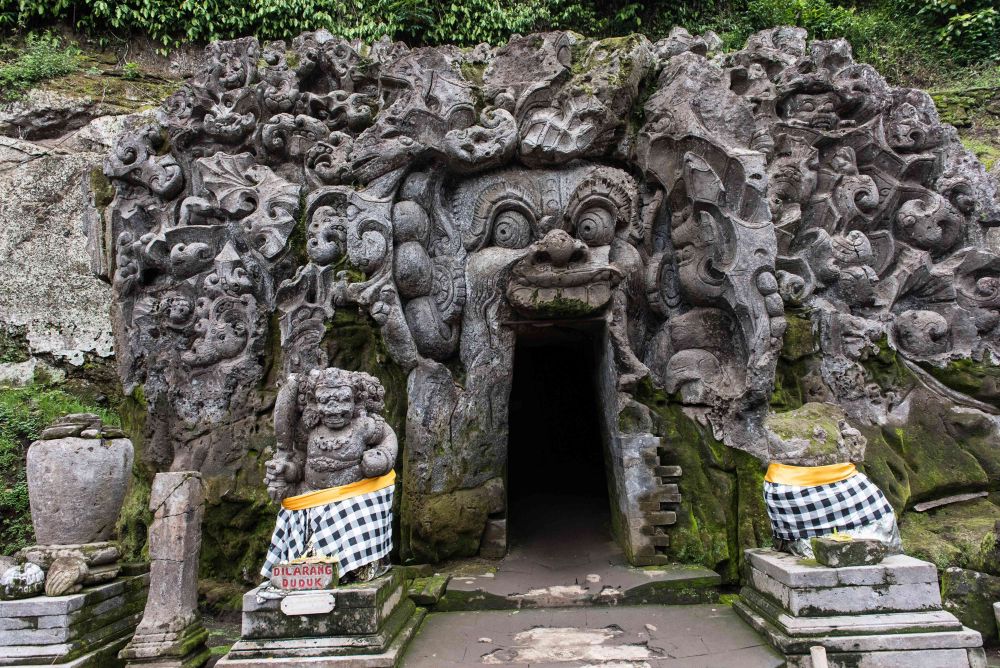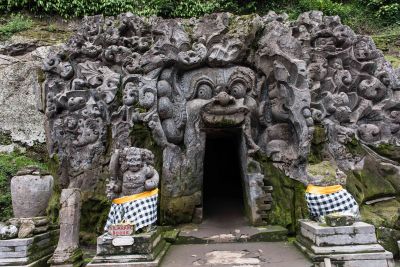

Discover the ancient Goa Gajah Temple, often referred to as the Elephant Cave, which dates back to the 9th century. Visitors can admire the intricate rock-wall carvings, explore the meditation caves, and view the relics and statues that represent Hindu influences. A central figure might be the menacing face of Bhoma, who is believed to guard the cave's entrance. The complex includes several Hindu temples, a peaceful pond, and lush gardens. Engage with the history by taking a guided tour that explains the significance of the complex in Bali's cultural and religious practices, giving you insight into the island's historical development and the blend of Hindu and Buddhist elements.
Join a knowledgeable guide and delve deep into the history of Goa Gajah. Your guide will walk you through the archaeological site, providing detailed explanations about the ancient temple, its discovery, conservation efforts, and its ongoing importance to the Balinese culture. The tour might include a visit to the bathing pools adorned with statues of Hindu angels, the central meditational cave, the fountains, and the various relics that are scattered throughout the premises. A good guide can help you understand the symbolism of the carvings and sculptures, alongside stories and legends that surround this historical place.
Occasionally, cultural performances are held in the vicinity of Goa Gajah, showcasing traditional Balinese dances and music. These events offer a visual feast of rich costumes, elaborate makeup, and storytelling through dance. The performances typically narrate Balinese myths and legends, creating a captivating atmosphere enhanced by the temple's ancient backdrop. Attending one of these performances not only supports local artists but also provides a deeper appreciation for the island's traditions.
Capture the beauty and mystique of Bali's Goa Gajah with a special photography tour that guides you through the most picturesque spots. Experienced photographers can advise you on the best angles, times of day, and settings to catch the play of light over the temple ruins and surrounding jungle. Whether you're an amateur or a professional, the unique setting of the Elephant Cave and its grounds provides a stunning subject for your photographs. This activity often includes helpful tips and tricks for capturing the essence of Balinese culture and the ancient temple's details.
Goa Gajah is considered a spiritual place, and visitors can participate in traditional Balinese cleansing rituals at the sacred fountains. The experience usually includes a Hindu priest who guides participants through the ritual, which involves making offerings and bathing in the fountain’s holy water to cleanse oneself spiritually. This is an intimate encounter with Balinese Hindu practices, offering a chance for reflection and peace in a serene temple environment. It's a unique and personal way to engage with the spirituality that imbues every corner of Bali.
The tranquil ambiance of Goa Gajah serves as a perfect setting for yoga and meditation sessions. Tailored classes are available where practitioners can immerse themselves in peace and mindfulness amidst the temple's ruins and lush greenery. The natural surroundings contribute to an elevated spiritual experience, allowing individuals to connect deeply with themselves and the environment. Yoga and meditation guidance are typically offered by experienced instructors who can cater to all levels, from beginners to those with an advanced practice.
Embark on a cycling tour that takes you through the quaint villages surrounding Goa Gajah. The tour typically starts at the temple complex and winds through scenic rice paddies, local artisan communities, and traditional Balinese homes. This is a wonderful way to experience the rural life of Bali and see the daily activities and routines of local residents. Cycling tours often include stops at local markets, farms, and artisan workshops, providing a holistic and engaging picture of Balinese culture. Participants can expect a blend of light exercise, education, and thrilling sights.
Near Goa Gajah, visitors have the opportunity to taste the flavors of Bali with a culinary adventure. Local restaurants and warungs (small family-owned businesses) offer traditional Balinese dishes such as babi guling (suckling pig), nasi campur (mixed rice), and sate lilit (minced seafood satay). Some venues provide cooking classes, where you can learn to prepare these dishes under the tutelage of a local chef. This experience gives you not only the chance to enjoy Balinese cuisine but also to bring home the knowledge to recreate the island's culinary delights.
Indulge in a traditional crafting workshop where local artisans share their skills in making Balinese handicrafts such as wood carving, batik painting, or jewelry making. Workshops can be found in the areas surrounding Goa Gajah, and participants will learn the history and techniques essential to the craft. Creating your own piece provides a memorable souvenir, and the hands-on experience brings a personal connection to the Balinese culture and its artistic expressions.
The lush landscapes around Goa Gajah are rich with medicinal plants and herbs used in traditional Balinese healing practices. Guided nature walks introduce visitors to this aspect of local culture. An expert in Balinese herbalism will explain the uses and properties of various plants found in the wild. This activity not only educates participants about natural medicine but also offers a tranquil and grounding experience as they stroll through the verdant countryside, connecting with Bali's flora.
